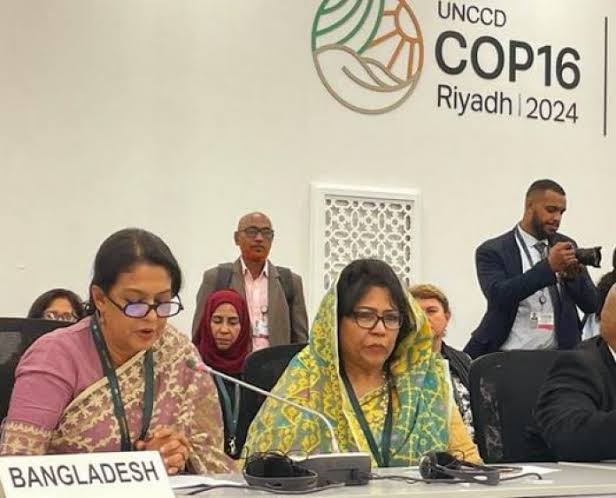Staff Correspondent
Published:2024-12-05 21:59:56 BdST
Bangladesh calls for legal recognition of people's right to water, land, food at UNCCD COP16
Syeda Rizwana Hasan, advisor to the Ministry of Environment, Forest and Climate Change of Bangladesh, has urged the global community for legal recognition of water, land, food and environment.
She highlighted the importance of regulating international trade and the transboundary movement of agrochemicals through due diligence in production processes.
She further stressed that public support for financing, technology transfer, and capacity building is vital, but such support should not extend to water-intensive industries or unsustainable agricultural practices.
The advisor said this while delivering her speech at the Formal Statements session of the ongoing UNCCD COP16, held on 3 December 2024, emphasising the urgent need for global action to combat desertification and achieve environmental justice.
In her speech, Rizwana Hasan said as a lower riparian nation, Bangladesh seeks regional cooperation for river basin management and hopes UNCCD COP16 will guide global and national political visions towards achieving a land degradation-neutral world.
Highlighting Bangladesh's challenges, Rizwana Hasan noted that the country must feed 170 million people with just 14.8 million hectares of land, one of the world’s lowest per capita land availability.
She warned that rising sea levels (SLR) could result in the loss of one-third of the country’s land mass by 2050, exacerbating food insecurity.
Excessive use of groundwater and agrochemicals for high-yield rice production has also caused severe land contamination.
Rizwana Hasan shed light on Bangladesh’s vulnerability as an active delta. Annual river erosion displaces over 1 million people, while the country loses 2.6% of its forests annually—double the global average.
Coastal salinity has surpassed critical levels over the past three decades, and reduced water flows in 57 transboundary rivers due to upstream diversions have aggravated waterlogging and river flow issues, intensifying the nation’s challenges.
She urged the global community to act collectively for environmental and climate justice, addressing the huge financial gap in adaptation.
“Recognizing the limits to adaptation, ambitious mitigation action is imperative to save the planet and limit temperature rise to 1.5°C,” she stated.
Bangladesh reaffirmed its commitment to working with the global community for a sustainable future, calling for actionable outcomes from COP16 to combat desertification and ensure climate resilience.
Environment Secretary Farhina Ahmed was also present at the programme.
Unauthorized use or reproduction of The Finance Today content for commercial purposes is strictly prohibited.


